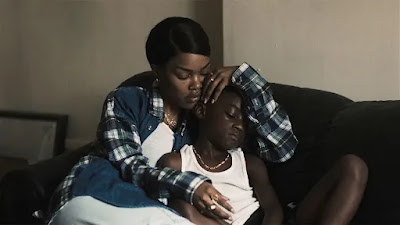She's a scrapper, though; you give her that at least. I hadn't seen Taylor in anything before this, but she is exceptionally convincing here, not just demographically, as a representative of a specific socioeconomic group, but emotionally, as a young woman feeling her way from trained tenderness - what a mother feels she ought to feel for her baby; it doesn't have to be much to be preferable to the indifference of the foster system as depicted - to something more genuine and affecting. Rockwell shows us a heroine who forever appears to be learning on the job - or two jobs: keeping a roof above her head, and becoming a guardian to a sensitive, awkward son. Around her, this filmmaker displays a particular gift for cutting through and around humdrum plot stuff that is both instinctive and interesting. You could be forgiven for not noticing Inez has effectively kidnapped this lad, until the story recurs in the newspaper and on the radio. (The fact the authorities don't respond with any great urgency tells you a lot about the strain the social-care system was under at the turn of the millennium: we're watching one broken home among many.) A fellow bearing the somewhat ironic name of Lucky (William Catlett) turns up unannounced in Inez's front room, having apparently gained her affections; we skip forward to 2001, before you know it, and then it's 2005, and everybody's circumstances have changed yet again.
It's clear Rockwell means to trade not in artful contrivance, but real-seeming (which is to say often arbitrary-seeming) life. She has a novelist's way of fully inhabiting and thereby expanding isolated moments in time: the excitement and boredom of a six-year-old left home alone all day, or a night Inez spends in on her own, cry-laughing into a Pot Noodle. (Like her characters, the writer-director is making the best possible use of the cards everybody's holding at any given turn.) So resistant is this screenplay to conventional narrative patterns that when something resembling a plot reveal barges in amid the final act, it seems like an interloper; you watch Rockwell herself trying to come to terms with it, and to finesse it as representative of her characters' questionable decision-making rather than her own. A universally excellent (though largely unfamiliar) cast work in her favour, though, and as a consequence, A Thousand and One feels unusually truthful about the myriad ways days, nights and lives drift away, people get ground down, and - even when entered into with the best intentions - relationships flounder and fall apart. Rockwell doesn't as yet have the pulsing commercial instincts of those 90s indie kids: one question her film floats is whether Terry might have been better off left within the system, and the answer to that isn't always obvious or reassuring. Yet she has an abundant sensitivity - something like Barry Jenkins without the romanticism - and applying that to this story results in something rare and precious: a modern American film that feels three-dimensional and lived-in, that bears the mark of actual human experience. Stealthily and skilfully, Rockwell nails these characters to the inside of your cranium. You'll think about them again from time to time; you may also worry about what they would be doing with their lives in the America of 2024, should they have made it this far.
A Thousand and One is currently streaming via NOW TV, and available to rent via Prime Video and YouTube.

No comments:
Post a Comment